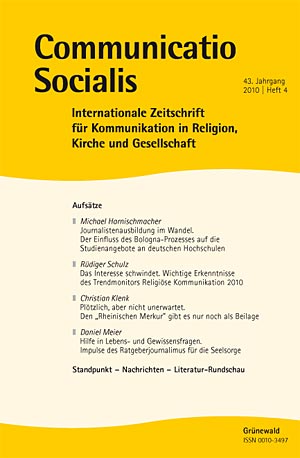Der Papst im Spiegel der Öffentlichkeit. Auswirkungen mangelhafter Kommunikationspolitik – untersucht anhand von zwei Fallbeispielen
Schlagworte:
Journalistik, Berichterstattung, Journalismus, Medien, Papst, Benedikt XVI., Kritik, Pressearbeit, Öffentlichkeitsarbeit, Kommunikation,Abstract
Die Medienberichterstattung über Papst Benedikt XVI. ist in der Regel kritisch, häufig negativ, manchmal sogar vernichtend – auch in Deutschland. Während man 2005 die Wahl von Joseph Kardinal Ratzinger zum ersten deutschen Papst seit fast 500 Jahren noch überschwänglich feierte, wurden manche Äußerungen und Handlungen des deutschen Pontifex heftig kritisiert. Dabei stechen zwei Fälle besonders hervor: der Fall „Mohammed“ aus dem Jahr 2006 und der Fall „Williamson“ aus dem Jahr 2009. Beide Fälle haben weltweit zu einer äußerst negativen Berichterstattung über Benedikt XVI. und diese wiederum zu teilweise heftigen Reaktionen geführt. Der Beitrag erörtert, wie die negative Berichterstattung zustande kam und wie seitens des Vatikans darauf reagiert wurde. Der Autor kommt zu dem Ergebnis, dass die negative Berichterstattung über Benedikt XVI. größtenteils aus einer mangelhaften Kommunikationspolitik resultierte: einer mangelnden Antizipation der massenmedialen Kommunikation und deren möglichen Implikationen sowie einer verspäteten und uneffektiven Reaktion auf die Berichterstattung. Es wird deutlich, dass die Kommunikation des Vatikans den Möglichkeiten und Erfordernissen der modernen Massenkommunikation weit hinterherhinkt – und der Vatikan und die Welt außerhalb des Vatikans kommunikationspolitisch regelrechte „Parallelwelten“ darstellen.
English
Gerd Strohmeier: The Pope in the public sphere. Consequences of a poor Communication Policy
Usually media covering of Pope Benedict XVI is critical, often times negative and sometimes even devastating – as well in Germany. Whereas the election of the first German Pope after almost 500 years was highly celebrated, afterwards many of his views, opinions and actions have been heavily criticized. Especially the two cases of the remarks on „Mohammed“ at the university of Regensburg (2006) and the reinstallation of bishop Williamson (2009) evoked worldwide a very negative coverage of Pope Benedicts’ views which in return led to very sharp reactions. This article examines the reasons for the negative coverage and the reactions by the Vatican. The result shows a great problem of the Vatican in public information and a deficit in communication policy: poorly anticipation of reactions on mass media coverage including possible implications as well as delayed and inadequate informations. The research shows clearly: Vatican communication does not match the possibilities and challanges of modern mass communication. The Vatican and the outside world are living in real parallel worlds side by side.

